Jack DeJohnette - The Elephant Sleeps But Still Remembers (2001)
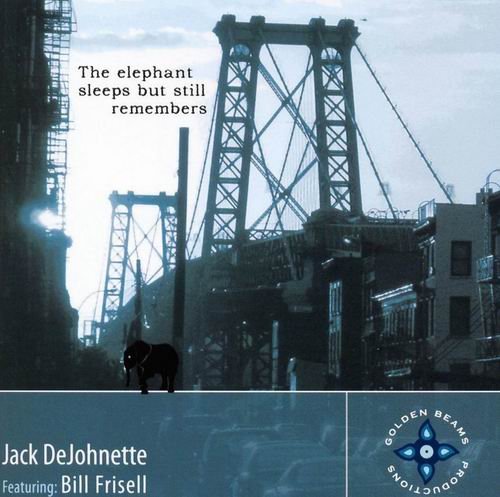
Artist: Jack DeJohnette
Title: The Elephant Sleeps But Still Remembers
Year Of Release: 2001
Label: Golden Beams Productions[GBP-CD-1116]
Genre: Jazz, Avant Garde Jazz
Quality: FLAC (image + .cue,log,scans)
Total Time: 61:28
Total Size: 348 MB(+3%)
WebSite: Album Preview
TracklistTitle: The Elephant Sleeps But Still Remembers
Year Of Release: 2001
Label: Golden Beams Productions[GBP-CD-1116]
Genre: Jazz, Avant Garde Jazz
Quality: FLAC (image + .cue,log,scans)
Total Time: 61:28
Total Size: 348 MB(+3%)
WebSite: Album Preview
1 The Elephant Sleeps But Still Remembers 11:26
2 Cat And Mouse 2:22
3 Entrance Androids 7:24
4 The Garden Of Chew-Man-Chew 4:06
5 Otherworldly Dervishes 8:36
6 Through The Warphole 2:25
7 Storm Clouds And Mist 5:04
8 Cartune Riots 1:21
9 Ode To South Africa 10:18
10 One Tooth Shuffle 1:18
11 After The Rain 7:13
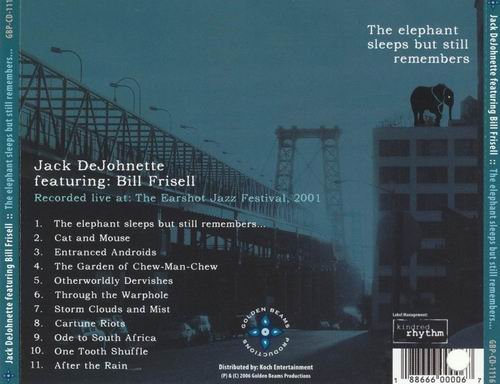
personnel :
Drums, Percussion, Vocals, Piano, Producer – Jack DeJohnette
Guitar, Banjo – Bill Frisell
This collaboration between drummer, pianist, and composer Jack DeJohnette and guitarist Bill Frisell, was recorded live at the Earshot Festival in 2001. But it doesn't end there. The pair, who had only played together once before on Don Byron's Romance with the Unseen, had a chance to listen to the tapes together and decided to add some additional production to the tracks. DeJohnette called in sound engineer Ben Surman, who added "additional production": basslines, ambient sounds, and other electronics and percussion. If you are raising your eyebrows in doubt, think again. One listen to the title track that opens the album should convince you otherwise. Here, a simple blues-like figure becomes a riff that the pair build upon, turn inside out, and make into a labyrinthine journey. Surman's added basslines root the proceedings deeper into the groove. His ambient and electronic sounds are far from distracting. They are more painterly, unobtrusive and yet colorful. Frisell and DeJohnette are such fine listeners and intuitive players that they anticipate one another without ever going over the line that makes free improvisation wankery. The art of the duo comes down to one concept ultimately, and that is true collaboration; musically the pair travel someplace different from where they began. Surman's added touch is a grounding exercise for the listener. And it's true it might have been a different recording if it had only been heard as an un-retouched performance. But in a sense, it is. It's here, mistakes and all, and it's far from covered. It's merely colored a bit. The electronic percussion that leads off "Entranced Androids" is actually coming from Frisell's guitar. Its seven-and-a-half minutes are a strange and terrible wonder of musical language pushed to the edge. DeJohnette's rim-shot percussion keeps it somehow grounded, but he's traveling, too -- Surman's post-production work brings out the true weirdness of Frisell's riffing. There are some truly, outrageously out moments here, too, in the brief "Cat and Mouse," "Otherworldly Dervishes," where Frisell plays a free-music banjo, and the sheer soundscape weirdness that is "Through the Warphole" are examples. They seem to be every other track. The edgy funk on "Storm Clouds and Mist," touches on blues, jazz, rock and deep funk. Frisell's response other rhythms being offered him are tough, lean, and fluid. The dub effects by Surman are tasty. DeJohnette plays piano on "Cartune Riots," and Frisell stays all but hidden until halfway through the cut. DeJohnette's pianism is lyrical, quirky, and deeply rooted in the lower-middle register. The duo really cut loose on "Ode to South Africa," which has Frisell quoting Dudu Pukwana, Johnny Dyani, and Abdullah Ibrahim, as DeJohnette's drumming rolls around in stretched time. Surman's added touch of vocals and regional percussion instruments makes the cut sing. The set ends with a reading of John Coltrane's "After the Rain," with DeJohnette once again on piano. Its balladic structure is preserved, and the space and silence that enter between the lyric phrases allow for Frisell and his digital delay to shape, color, and texturize its gorgeous melody. This is one of those records for the fan who has to have everything, but that said; it is thoroughly enjoyable on its own merit. Highly recommended.~Thom Jurek
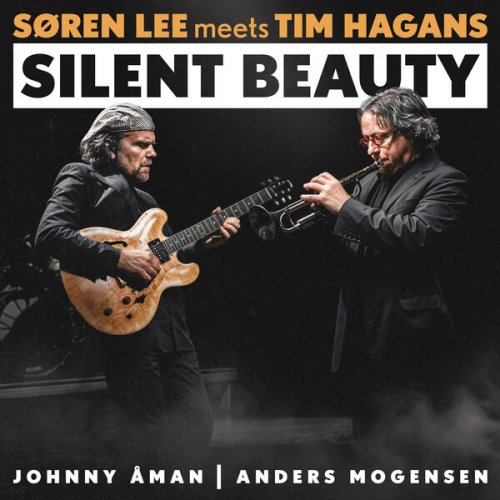
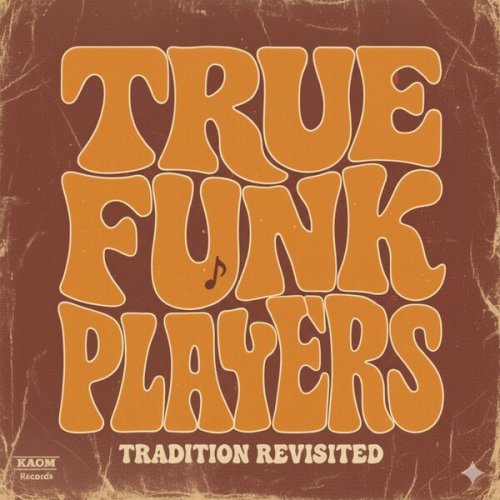
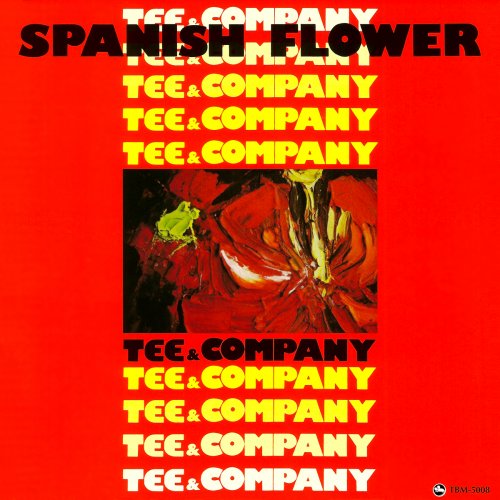
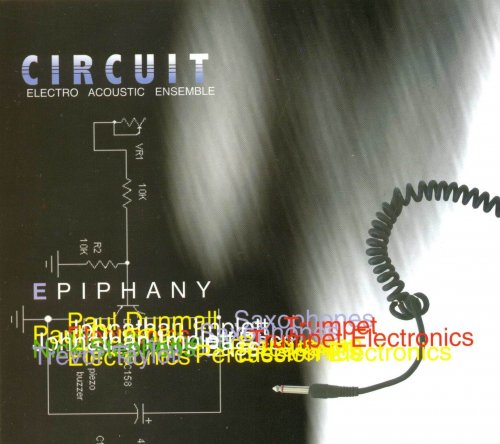
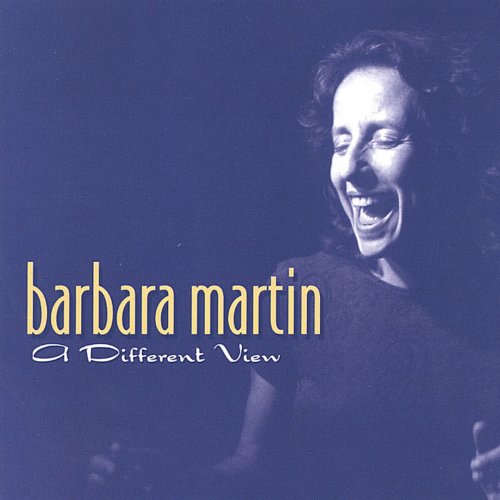
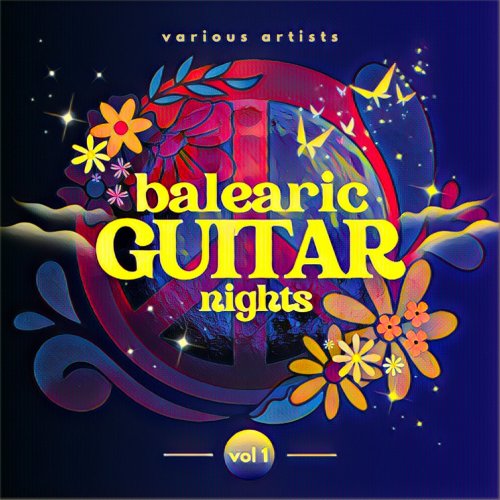
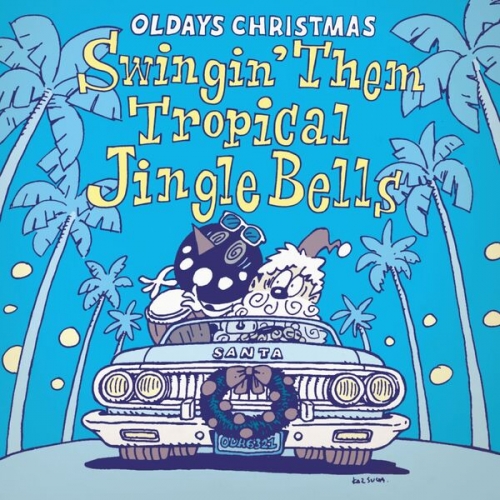
![Larry Coryell - Major Jazz Minor Blues (1998) [CDRip] Larry Coryell - Major Jazz Minor Blues (1998) [CDRip]](https://www.dibpic.com/uploads/posts/2026-02/1771860317_5.jpg)
![The Messthetics & James Brandon Lewis - Deface The Currency (2026) [Hi-Res] The Messthetics & James Brandon Lewis - Deface The Currency (2026) [Hi-Res]](https://www.dibpic.com/uploads/posts/2026-02/1771424652_1.jpg)